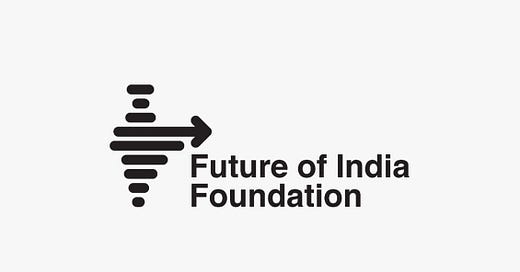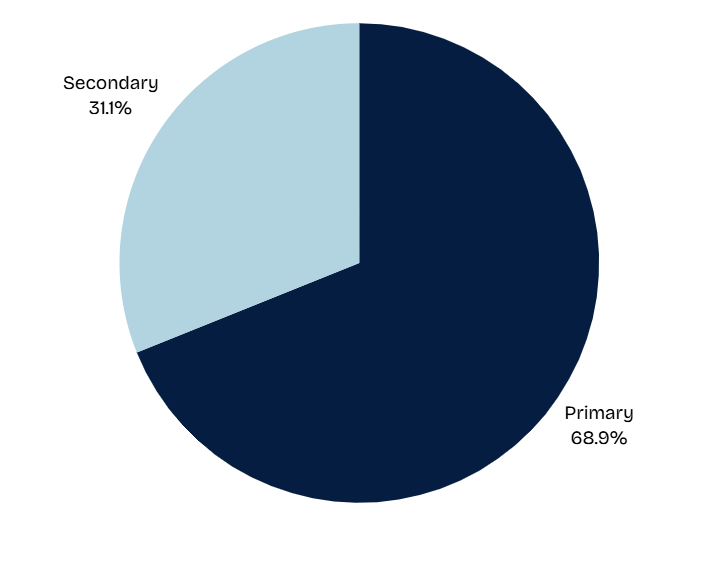The Parliament Tracker: Parliament on AI (Part 2)
Parliament Tracker: Rajya Sabha, June 2019 to April 2025
The Future of India Foundation’s Parliament Tracker, part of the Public Record series, provides ongoing analysis of parliamentary engagement on critical national issues—youth employment, women’s issues, Dalit and Adivasi concerns, and artificial intelligence.
Below is an analysis of parliamentary engagement on AI from June, 2019 to April, 2025. Find the methodology here.
To get a detailed overview of India’s AI strategy, read the Future of India Foundation’s report,"Governing AI in India: Why Strategy Must Precede Mission" which offers an evidence-based analysis of why India's current AI governance is not suited to support India’s leadership ambitions in AI — both because it fails to address then structural challenges required for India to move to the AI frontier and because it lacks the domestic democratic legitimacy needed to lead in forums like GPAI.
Download the full tracker here.
Read about the Lok Sabha’s activity on AI here.
Rajya Sabha Overview
Total Questions: 53,034
Questions on Artificial Intelligence (AI): 312
~0.6% of the question focused on artificial intelligence
Focus of Questions
Of the questions referencing AI, a little less than third mentioned AI only in passing or as part of broader discussions, framing it as an add-on rather than the central concern.
The Pattern Continues: Rajya Sabha Questions Reflect Both Optimism and Diffidence on AI
Similar to the Lok Sabha, questions in the Rajya Sabha were skewed toward the application and integration of AI, accounting for 40.4% of the total. In contrast, key democratic concerns such as impact, strategy, and regulation received relatively less attention. However, the Rajya Sabha (11.1%) slightly outpaced the Lok Sabha (7.3%) in raising questions specifically related to AI regulation. MPs raised inquiries about introducing dedicated AI legislation or amending existing laws to regulate AI technologies and tools. Some also questioned whether India plans to adopt a regulatory framework similar to the EU’s AI Act, highlighting concerns around misuse, ethical guidelines, and broader issues of digital governance.
Sectoral Focus of Questions
Parliamentary questions on AI integration and application focused on various sectors, the top two being education and training, and transportation. In transportation, questions spanned across railways, civil aviation, and road traffic, with AI seen as a tool for traffic management and improving efficiency and safety—such as preventing wildlife deaths on railway tracks using AI-enabled sensors. In education and training, MPs focused on using AI to enhance training programmes and enable personalised learning.
Increasing Engagement Over Time
Between June 2024 and April 2025, 38% of the Rajya Sabha MPs raised questions related to AI—an increase from 32% in the entire five-year period from June 2019 to June 2024. This reflects a slow but growing interest in AI within Parliament.
Rajya Sabha MPs more active on AI regulation
While in the Lok Sabha, the number of MPs who asked at least one question on AI regulation nearly doubled from the 17th to the 18th Lok Sabha, the Rajya Sabha has shown more consistent engagement on this front. Between the two periods under consideration—sessions from June 2019 to June 2024 and from June 2024 to April 2025—more MPs raised regulatory questions in the earlier period. However, given that the latter spans just 11 months compared to five years, this indicates that regulatory concerns have remained a consistent area of interest in the Upper House of the Parliament.
Which Ministries Received the Most Questions?
The Ministry of Electronics and Information Technology (MeitY), which plays a central role in shaping India’s AI policy and strategy, received the highest number of AI-related questions in the Rajya Sabha across both periods combined. MeitY is followed by the Ministry of Skill Development and Entrepreneurship (MSDE) and the Ministry of Education (MoE).
Growing Parliamentary Engagement with AI
Parliamentary attention to AI in the Rajya Sabha has grown steadily over time, with a sharp surge in recent months. Between mid-2019 and 2022, both the number of AI-related questions and the number of unique MPs engaging with the topic remained relatively low. A noticeable uptick began in 2023, possibly influenced by the launch of Chat GPT by Open AI in late 2022, with peaks in December 2024 and March 2025. The growing number of MPs raising AI-related issues suggests a widening recognition of AI as a significant and emerging policy concern.
About the Parliament Tracker
The Future of India Foundation’s Parliament Tracker, part of the Public Record series, provides ongoing analysis of parliamentary engagement on critical national issues—youth employment, women’s issues, Dalit and Adivasi concerns, and artificial intelligence.
This edition covers the full term of the Rajya Sabha from June 2019 to April 2025. Subsequent editions will track developments on a session-by-session basis.
Stay tuned for more insights like these.










